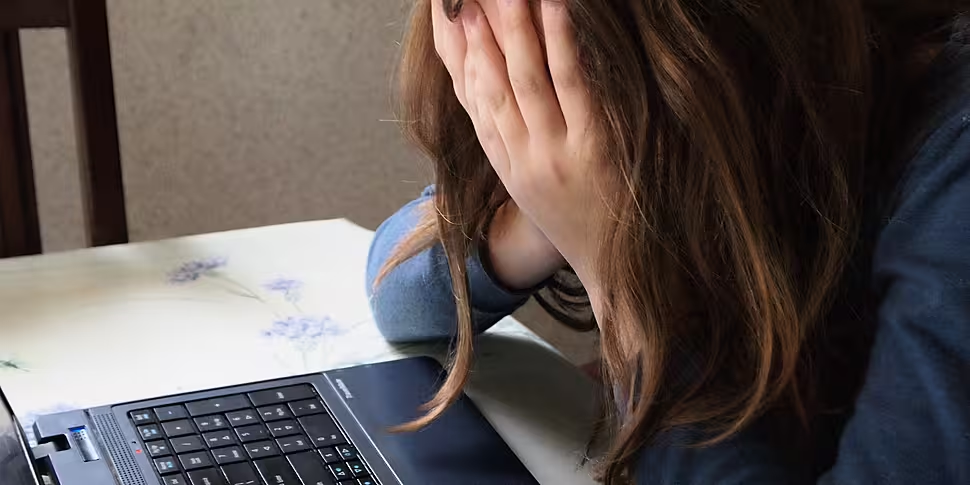On this week's 'Parenting' segment on the Moncrieff show, one listener sought advice on what to do after his 11-year-old daughter found some pornography on his laptop.
Joanna Fortune, a psychotherapist specialising in child and adult psychotherapy, offered some guidance.
Listener question
My 11-year-old daughter found some porn on my laptop when she was doing some school work.
She doesn't ever use my laptop but hers had died and she wanted to finish her work so I loaned her mine not even thinking.
She got an awful fright when she saw it and doesn't understand what she saw. She keeps asking who they are and if I know them.
I feel devastated that this happened and my wife, understandably, is furious. My daughter hasn't been the same with me since. How can I talk to her about this?
Joanna Fortune's advice
"The reality is that kids come across porn at some stage, it's something as parents that we must talk about and add into that that the average age globally would point to approximately ten years old being the average age for children to first see or access or view pornography. You will always have kids who've seen it younger and some who have seen it older, it's just the average age.
"But a conversation about this is definitely worth having and she's at an age where I would be saying to you, you should be having this conversation anyway. Your conversation is going to be particularly framed around the fact that she has seen something that was in your possession and that is directly linked to her saying, 'Well you watch it, why do you watch it'. Your conversation is slightly different and not as generalised as it is for most parents having this conversation.
 File photo. Credit: StockSnap from Pixabay
File photo. Credit: StockSnap from Pixabay"When you talk about it with her, you want to talk about what it is, what it is not, and be very clear about how you frame it. You go to her and say, 'You saw an adult movie on my laptop, I wish you hadn't because it's not for kids, it's for adults, and that was my fault for not closing it down before you borrowed my laptop'. So you're clear you're not blaming her, it's not her fault she saw it, but you're also putting up the boundary that this is adult content, adult material and it was never intended for her to see it.
"Before you have any conversation about a topic like this, or anything like it, be very clear about the messaging you want to convey, what message do you want to put across. Because it's important you know you can have a sex-positive conversation, talking about sex, sexuality, intimacy, consent, and you don't have to demonise porn or dismiss it but you do want to put a boundary on 'it's not for her, it's not for children to look at'.
"You want to talk to her about what she has seen then, you know, porn, it's not real, it's acting, it's very different from sex between people in real life, and then you would go back to that conversation about intimacy and affection and love and being sex-positive about how you talk about that. But you are clearly saying it's not real, it's a movie, I do not know those people, in answering your question, because they're actors in a movie.
 File photo. Credit: Pedro Fiuza/Xinhua News Agency/PA Images
File photo. Credit: Pedro Fiuza/Xinhua News Agency/PA Images"So all of that is honest and open but you are responding to the questions that she has. I think she might want to ask her dad 'why, why do you watch it'. And just to be real about that, because the fact is she knows it was yours. and she might go, that's all well and good and I get it, but why are you watching it. if, or when, that question comes up...remind her again that the movies aren't real life, they're actors and they're not people toy know and keep going back to, 'these are for adults, they're not for children and you weren't supposed to see it'.
"I think you have to do it because she has to make sense of it and make meaning of what she's seen, otherwise it is overwhelming, it is confusing, so you have to help her make sense of it however you go about this. And I'm noting your wife is understandably furious as you put it and my assumption in reading it is she's furious that your daughter saw it. But I think the two of you want to get on the same page and have this conversation together so your daughter knows she can come to you and ask difficult questions about difficult things to either of you.
"When you plan your conversation, I always think it's useful as parents to have these conversations with each other, so the first time you say these words is not when you're sitting with your 11-year-old, that you've almost had a run-through or a practice with each other. Do that with each other before you talk to her but I wouldn't wait too long, she's seeing it on your laptop, she knows it's yours, she's asking the questions and when children ask questions you have to give them answers."









